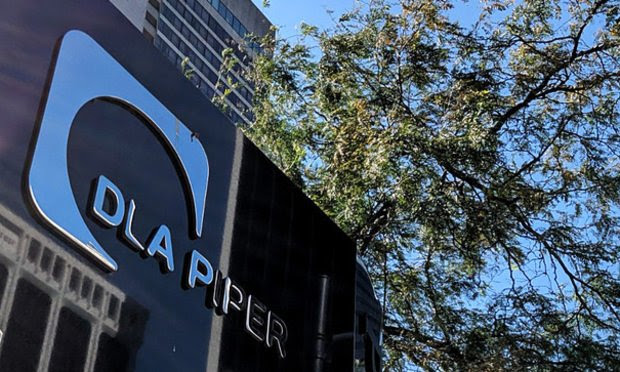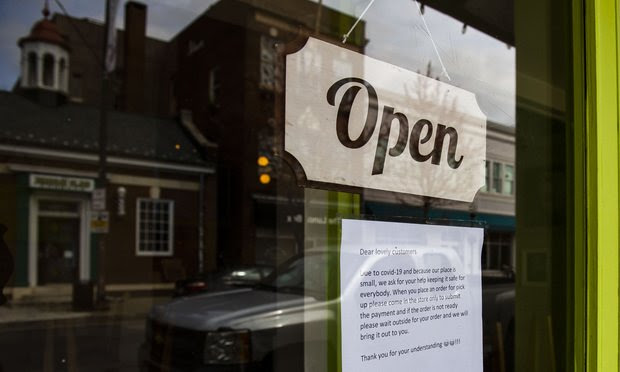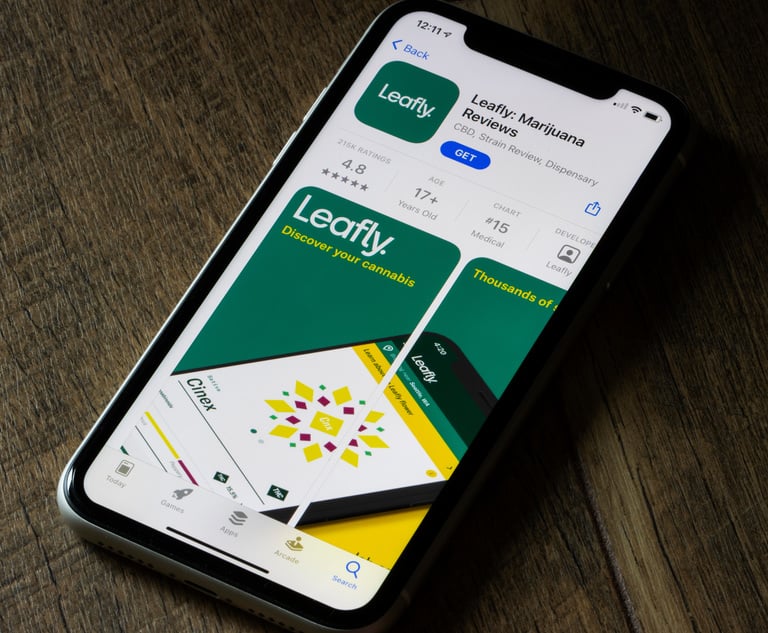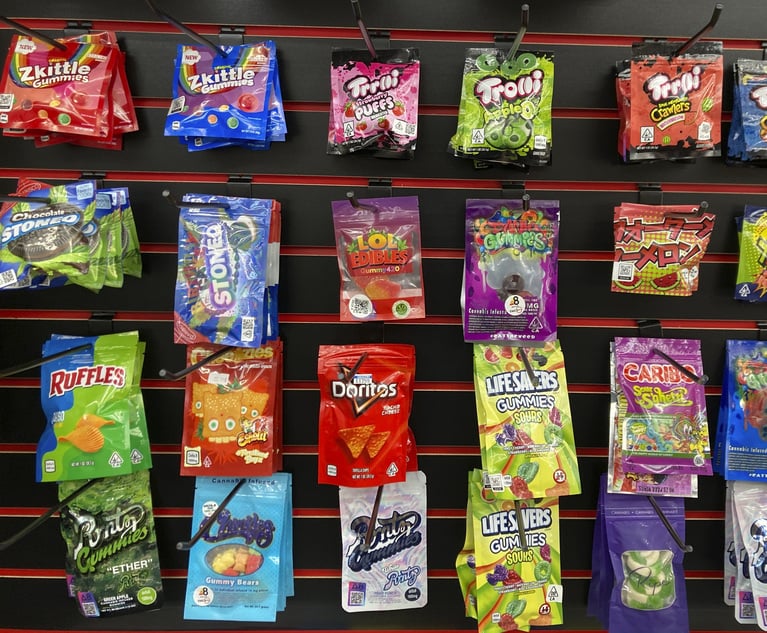Higher Law: Q&A: Social Equity in Cannabis Industry | Big Law Firm Sues Maine | Marijuana Is 'Essential' | Upcoming Webinars
Welcome to Higher Law. A corporate lawyer's take on social equity laws • Cozen O'Connor's challenge of Maine's recreational regs • DLA Piper of Canada's guidance on a $69 million acquisition • "Essential" marijuana during the covid-19 pandemic
March 26, 2020 at 04:00 PM
8 minute read
Welcome back to Higher Law, our weekly briefing on all things cannabis. I'm Cheryl Miller, reporting for Law.com from Sacramento.
This week we're looking at: A corporate lawyer's take on social equity laws • Cozen O'Connor's challenge of Maine's recreational regs • DLA Piper of Canada's guidance on a $69 million acquisition • "Essential" marijuana during a pandemic
Thanks for reading. How are you dealing with the new coronavirus reality? What about your firm? Your clients? Tell me about it at [email protected] or call me at 916.448.2935. Follow me on Twitter @capitalaccounts.

Q&A: Social Equity in the Cannabis Industry
Everyone's work is touched by the coronavirus these days, and Kevin Slaughter, a corporate practice partner at Levenfeld Pearlstein in Chicago, is no exception. I recently caught up with him after a long day of fielding calls from clients worried about planned transactions that suddenly seemed uncertain.
Slaughter took a few minutes to talk to me about another issue that he's heavily involved with: social equity. Slaughter represents Viola Brands, a minority-owned, multistate cannabis company. Here are some excerpts from our conversation, edited for length and clarity. Higher Law: What exactly does social equity in the cannabis world mean?
Kevin Slaughter: Social equity, as it's being used, is something that developed out of what started as a lack of minority participation. But because of the equal protection clause you can't really come at it from a minority standpoint.
So the double-edged sword is, and it's no secret, the communities and the people that were most affected by the criminalization of cannabis were black and brown people. At the same time, here in Illinois, right now there are no minority-owned cannabis operators. None. Zero.
So these laws aren't working?
The issue is that these application processes are very competitive and oftentimes determined by a point or less. So in Illinois, when they adopted the new language for the adult-use law and started rolling out the application process there were 250 points total that were possible to get. And if you qualified as a social equity applicant you got 50.
Well no one could afford to leave 20 percent of the points on the table. So people started reading the regulations and they technically comply with the rules. But on the ground you have situations where large [multistate operators]–some of them were more egregious than others–would actually enter into contractual arrangements where the minority owner really didn't have ownership or control and they definitely wouldn't see any type of economic benefit.
Some were blatant and said 'I'll literally pay you to be on the application but you know this isn't real." And then there was the middle ground–"We'll cover all the costs in the beginning, we'll take care of the application process and if we're successful we'll do a valuation and you'll have an opportunity to buy your pro rata share."
Well, you're not going to have the money if you do that. On the back of a napkin if you were to get a dispensary in the right location of Chicago, that's easily $15-$20 million. Who's going to come up with half of that, the 51 percent part? They're not. They're going to get paid out for a nominal amount.
So what's the answer?
The way to improve on the structure that we have to live with is for states to actually enforce the law.
If you're a [minority-owned business enterprise] and you're trying to get certified so you can get government contracts, you get examined with a microscope. They look at the agreement. They look at the operative provisions. They actually get to the substance.
That's the kind of scrutiny that the state cannabis regulators need to pay when they're looking at these applications, especially the social equity portion of the applications.
I also think that if states were more precise about the preemption of [local rules] that would help. Because again, if you go back to the social equity argument and definition, it was the community level that was impacted by the war on drugs. It wasn't the state level. What do lawyers need to know about complying with social equity rules and trying to shape workable ones?
You have to understand how people manipulate the social equity rules. And really all you can do is meet with legislators as they're adopting the language.
In Illinois, one of the ways to qualify as a social equity applicant is, if you have 10 or more employees, 51 percent of those employees had to be either disproportionately harmed themselves by the war on drugs, i.e. arrested for a cannabis violation, or live in … a poor area.
But that's not really meaningful because you can just hire, if you've got 10 employees, six budtenders. That's not really minority participation. So in the states where they ask me for my advice I modify that to make it 51 percent of management or 51 percent of comp that's paid. That's far more meaningful.

Who Got the Work
>> DLA Piper (Canada) served as legal counsel to CBD product company Charlotte's Web Holdings in a $69 million deal to acquire Abacus Health Products. Osler, Hoskin & Harcourt advised Abacus.
>> Cozen O'Connor is one of three firms suing the state of Maine over recreational marijuana regulations that restrict licenses and business ownership to residents who have lived in the state for at least four years. Preti, Flaherty, Beliveau & Pachios and Murray Plumb & Murray are also representing NPG LLC, doing business as Wellness and Pain Management Connection. The case was filed March 20 in U.S. District Court for the District of Maine.
>> Greenberg Traurig won an anti-SLAPP motion for CBD education site Project CBD in a case before California's Fourth District Court of Appeal. Medical Marijuana Inc. and HempMeds PX had sued Project CBD for libel, false light and unfair competition claims tied to an article about the safety of a product sold by the plaintiffs. The plaintiffs were represented by Procopio, Cory, Hargreaves & Savitch.

In the Weeds…
>> Still open… Groceries, gas, booze and marijuana. A lot of us may be hunkered down at home, but states are making sure we can still access the essentials, including weed. Some states say only medical marijuana dispensaries can stay open. Others are blessing curbside pickups. Saidl one retailer about his customers: "They'll say things like, 'I'm going to be locked up with my wife for the next-God-knows-how-long and need this desperately.'" he said. [The New York Times]
>> Legalization in Mexico faces a roadblock, and it isn't COVID-19. Cannabis activists have camped out in front of the Senate, "playing music and passing joints," to oppose a measure on the table that they say favors corporations over small growers, my colleague Amy Guthrie reports. "Juan Francisco Torres Landa, Hogan Lovells' office managing partner in Mexico, says President Andres Manuel López Obrador could easily move the cannabis agenda forward—if it were a priority for him." [Law.com]
>> Florida's AG wants the Supreme Court to review a pot initiative. Ashley Moody, who opposes the initiative to legalize recreational initiative, said she wants the state's high court opinion on whether the measure can go before voters in 2022. Attorneys for the state senate asked the court to dismiss the issue as moot because initiative backers didn't submit enough signatures to put it on the 2020 ballot. [South Florida Sun-Sentinel]
>> An Ohio legalization measure failed to make the 2020 ballot. Ohio Attorney General Dave Yost said that backers of an initiative to regulate recreational marijuana like alcohol failed to submit enough valid signatures. Yost added that since petitioners failed to meet the signature threshold he did not make any findings about the "fairness and truthfulness" of the proposed summary. [Dayton Daily News]
>> Call it cannatizer. California cannabis manufacturer CannaCraft has converted a portion of its manufacturing space and production capacity to make hand sanitizer. A test run produced 40 gallons, or 5,000 one-ounce tubes of the coveted topical, that were distributed to employees and customers. The hand sanitizer will be donated to nonprofits, customers, employees and "essential businesses" and will be distributed by Kind House Distribution, the company said. [CannaCraft]

Calendar: All the Things
March 27 - BDS Analytics presents the webinar "Initial Impact of COVID-19 on the Cannabis Industry."
March 31 - The National Cannabis Industry Association hosts the webinar "In the Weeds–Cannabis Advocacy from the Statehouse to Capitol Hill." Speakers include Nossaman partners D. Michael Stroud Jr., Amber Maltbie and William Powers.
April 2 - The International Cannabis Bar Association hosts the webinar "The Path to Cannabis Appellations." Speakers include Richard Mendelson, of counsel at Dickenson Peatman & Fogarty; and Heather Burke, partner at Origin Group Law.
April 2 - Harris Bricken hosts a webinar for multistate cannabis operators. Firm attorneys Vince Sliwoski, Hilary Bricken and Alison Malsbury will present.
This content has been archived. It is available through our partners, LexisNexis® and Bloomberg Law.
To view this content, please continue to their sites.
Not a Lexis Subscriber?
Subscribe Now
Not a Bloomberg Law Subscriber?
Subscribe Now
NOT FOR REPRINT
© 2025 ALM Global, LLC, All Rights Reserved. Request academic re-use from www.copyright.com. All other uses, submit a request to [email protected]. For more information visit Asset & Logo Licensing.
You Might Like
View All
NY Cannabis Marketing Rulings / Rescheduling Effects / Honigman's Work on Trademark Suit / Goodbye
9 minute read
Workplace Weed and Labor Pacts / State AGs and Hemp / Maryland Licensing Suit / Vicente Sues Recruiter
9 minute readLaw Firms Mentioned
Trending Stories
- 1Uber Files RICO Suit Against Plaintiff-Side Firms Alleging Fraudulent Injury Claims
- 2The Law Firm Disrupted: Scrutinizing the Elephant More Than the Mouse
- 3Inherent Diminished Value Damages Unavailable to 3rd-Party Claimants, Court Says
- 4Pa. Defense Firm Sued by Client Over Ex-Eagles Player's $43.5M Med Mal Win
- 5Losses Mount at Morris Manning, but Departing Ex-Chair Stays Bullish About His Old Firm's Future
Who Got The Work
J. Brugh Lower of Gibbons has entered an appearance for industrial equipment supplier Devco Corporation in a pending trademark infringement lawsuit. The suit, accusing the defendant of selling knock-off Graco products, was filed Dec. 18 in New Jersey District Court by Rivkin Radler on behalf of Graco Inc. and Graco Minnesota. The case, assigned to U.S. District Judge Zahid N. Quraishi, is 3:24-cv-11294, Graco Inc. et al v. Devco Corporation.
Who Got The Work
Rebecca Maller-Stein and Kent A. Yalowitz of Arnold & Porter Kaye Scholer have entered their appearances for Hanaco Venture Capital and its executives, Lior Prosor and David Frankel, in a pending securities lawsuit. The action, filed on Dec. 24 in New York Southern District Court by Zell, Aron & Co. on behalf of Goldeneye Advisors, accuses the defendants of negligently and fraudulently managing the plaintiff's $1 million investment. The case, assigned to U.S. District Judge Vernon S. Broderick, is 1:24-cv-09918, Goldeneye Advisors, LLC v. Hanaco Venture Capital, Ltd. et al.
Who Got The Work
Attorneys from A&O Shearman has stepped in as defense counsel for Toronto-Dominion Bank and other defendants in a pending securities class action. The suit, filed Dec. 11 in New York Southern District Court by Bleichmar Fonti & Auld, accuses the defendants of concealing the bank's 'pervasive' deficiencies in regards to its compliance with the Bank Secrecy Act and the quality of its anti-money laundering controls. The case, assigned to U.S. District Judge Arun Subramanian, is 1:24-cv-09445, Gonzalez v. The Toronto-Dominion Bank et al.
Who Got The Work
Crown Castle International, a Pennsylvania company providing shared communications infrastructure, has turned to Luke D. Wolf of Gordon Rees Scully Mansukhani to fend off a pending breach-of-contract lawsuit. The court action, filed Nov. 25 in Michigan Eastern District Court by Hooper Hathaway PC on behalf of The Town Residences LLC, accuses Crown Castle of failing to transfer approximately $30,000 in utility payments from T-Mobile in breach of a roof-top lease and assignment agreement. The case, assigned to U.S. District Judge Susan K. Declercq, is 2:24-cv-13131, The Town Residences LLC v. T-Mobile US, Inc. et al.
Who Got The Work
Wilfred P. Coronato and Daniel M. Schwartz of McCarter & English have stepped in as defense counsel to Electrolux Home Products Inc. in a pending product liability lawsuit. The court action, filed Nov. 26 in New York Eastern District Court by Poulos Lopiccolo PC and Nagel Rice LLP on behalf of David Stern, alleges that the defendant's refrigerators’ drawers and shelving repeatedly break and fall apart within months after purchase. The case, assigned to U.S. District Judge Joan M. Azrack, is 2:24-cv-08204, Stern v. Electrolux Home Products, Inc.
Featured Firms
Law Offices of Gary Martin Hays & Associates, P.C.
(470) 294-1674
Law Offices of Mark E. Salomone
(857) 444-6468
Smith & Hassler
(713) 739-1250










